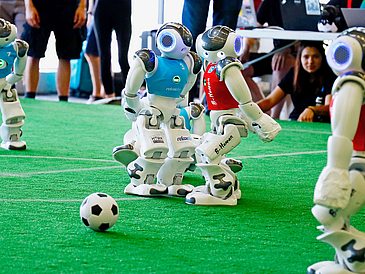University of Bremen and DFKI Bag The RoboCup World Championship
76 goals and not a single goal conceded – that is the tally of the Bremen robot soccer players at RoboCup 2023, the world’s largest competition for intelligent robotics. This is the tenth time that the Bremen team has won the title, thus underlining its top position in the Standard Platform League.
B-Human was able to defend its title from the previous year at the RoboCup in Bordeaux more clearly than ever before. The Bremen-based team won the final against HTWK Robots from Leipzig by a clear 9-0, scoring a total of 76 goals in eight matches without conceding a single one. Five of the eight games were ended prematurely due to the so-called mercy rule, which applies when the goal difference is 10:0. With this outstanding result, B-Human is by far the most successful team in the RoboCup Standard Platform League (SPL).
In the SPL, all teams play with the same robot model, the humanoid NAO from Softbank Robotics, but with different software. The league is divided into two sub-leagues, the Champions Cup, in which B-Human competes, and the Challenge Shield. Both are roughly equivalent to the first and second German leagues. After the competitions have finished, the Bremen-based company will make its algorithms available as open source so that other teams can benefit from them as well. The top three teams in the Challenge Shield, RoboEireann from Ireland, R-Zwei Kickers from Kaiserslautern, and BadgerBots from the U.S., all used software released by B-Human over the past two years in this year’s competition.
The Bremen Robot Soccer Team’s Recipe for Success
The unprecedented success of the Bremen team is the result of its superiority in numerous research areas. For example, the B-Human robots had no trouble performing under the influence of changing light conditions, such as playing near windows. Bremen’s NAOs know their exact position on the field, which allows them to play a precise passing game that no other team in the league is capable of. They also recognize other players accurately enough to shoot between them or sneak past them. In addition, B-Human’s robots are less likely to fall over than the competition’s NAOs because their running movements can compensate for many instances of contact with other robots. Last but not least, they are able to shoot accurately from a running position in many situations, which makes most passes possible in the first place.
More Than Just Collecting Titles and Trophies
To date, the Bremen team has won ten World Championships and thirteen regional championships. But B-Human is about more than just collecting titles and trophies: As a project at the University of Bremen, it introduces students to the development of software in an application-oriented manner and enables them to work intensively and independently over several semesters on issues of their own choosing relating to robot soccer. The academic publications “Dynamic Joint Control For A Humanoid Walk” and “Neural Network-based Joint Angle Prediction for the NAO Robot” resulted from the work on the NAO’s walking movements. These were presented by team members Philip Reichenberg, Thomas Röfer, Jan Fiedler, and Tim Laue at this year’s RoboCup Symposium, which traditionally marks the conclusion of the RoboCup.
Currently, B-Human is composed of 13 students from the University of Bremen plus one former student. They are supervised by scientists Dr. Thomas Röfer from the DFKI’s Cyber-Physical Systems research group, which is led by Professor Rolf Drechsler, and Dr. Tim Laue and Arne Hasselbring from Professor Udo Frese’s Multisensory Interactive Systems working group at the University of Bremen.

